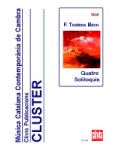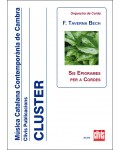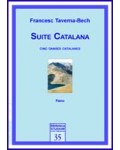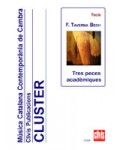
No products
Prices are tax included
Product successfully added to your shopping cart
There are 0 items in your cart. There is 1 item in your cart.
- English
- Castellano
- Català
Born in Barcelona on April 16, 1932. In his hometown, between 1952 and 1954, he attends musical studies and learns to play the piano, the violin, and musical composition.
In 1973 begins his dedication to music reviews at the same time that his career as a composer intensifies. His catalog today has eighty musical compositions, most of which have been programmed and played for the first time in the Catalonian music scene as well as Spain’s, and in other cities of Europe, Asia, and America. He has also been a judge in musical composition and interpretation competitions.
His articles have been published in Serra d’Or, Revista de Catalunya, Revista Musical Catalana, El Correo Catalán, Destino, Barcelona Metrópolis, and Barcelona Creació (Yokohama, 1990). He has also collaborated in the activities of the Universitat Catalana d’Estiu from Prada de Conflent (France).
After an evolutionary period that goes from neoclassical postulates (Suite Catalana) to proposals of an atonal and serial character (Calidoscopi, Díptic, Climes, Gèminis), he gathers the experiences extracted from these two forms, mixes them, and turns them into a new style with a markedly expressive content (Temperaments, Proses disperses), although on certain occasions he returns to the original styles (Camins Somorts, Auguris, etc.).
Francesc Taverna-Bech died 16 April 2010.
-
Quatre soliloquis
Edition: DigitalQuatre soliloquis by Francesc Taverna Bech has four evocative, passionate movements which can only facilitate communication if the player makes them his own in some small way. It opens with great refinement which is concentrated on an original melodic line giving rise to double chords.
9,30 € -
Quatre soliloquis
Edition: PrintedQuatre soliloquis by Francesc Taverna Bech has four evocative, passionate movements which can only facilitate communication if the player makes them his own in some small way. It opens with great refinement which is concentrated on an original melodic line giving rise to double chords.
16,00 € -
-
-
-
Suite Catalana
Edition: DigitalThese pieces also have a didactic side to them which makes them suitable for intermediate level piano teaching, with technical difficulties including elaborate piano formulas such as hand cross-overs, arpeggiated chords and three-stave notation, to be gradually overcome by students.
7,85 € -
-
-
-
Tres peces acadèmiques
Edition: DigitalThe Three Academic Pieces by Taverna-Bech stand out from the rest of his compositions for their expressive confidence, the clear concept they abide by and a certain austerity in the score that demonstrates, once again, his desire to express the maximum content with the minimum possible notes.
4,89 €










